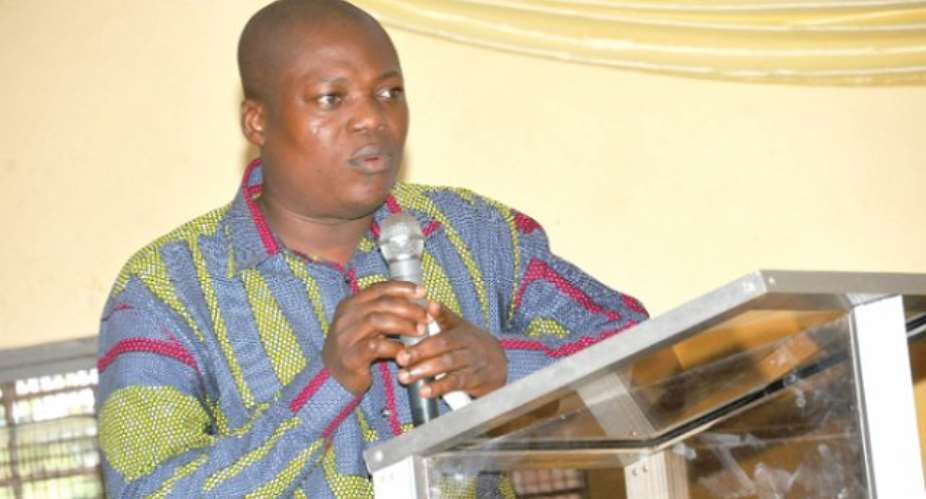The Association of Certified Chartered Economists has held its 5th Continuous Professional development (CDP) programme and induction in Accra.
In all a total of 41students were inducted, 39 as chartered members and two fellows of the association of chartered certified economists.
They had earlier written series of examinations and taken part in continuous professional development programmes to qualify.
Addressing a seminar as part of the induction, Head of Finance, School of Business at the University of Cape Coast Dr. John Gatsi addressed the application of reserve based financing also called reserve lending by financial institutions, and the limitation by the petroleum revenue management Act against oil companies which want to secure funding for upstream petroleum activities.
Dr. Gatsi noted that, as much as financial institutions may prefer this method to extend credit for upstream petroleum development activities, oil companies are limited by some sections of the petroleum revenue management act which limits these companies from using petroleum reserves as collateral to secure financing.
He said, “If you look at section 5 sub section 2 of the petroleum revenue management Act it is very clear that petroleum reserve shall not be used as collateral.”
“Again when you go to section 57 of the petroleum act, Act 919 it is very clear petroleum agreements and licenses and permits cannot be used for collateral for borrowing or for mortgaging” Dr. Gatsi said.
He noted that there exists a conflict between Act 919 and section 5of the PRMA, as the law also grants some allowance for the Energy Minister to grant permission for agreements to be mortgaged. According to Dr. Gatsi, this has to be clarified for borrowing activities of the country.
On his part lecturer at the department of marketing and supply chain management, University of Cape Coast, Innocent Acquah commented on emerging issues in public procurement.
He said despite the effectiveness of the public procurement act it still leaves much to be desired as it is not being strictly complied with. “We are running away from sole sourcing, even though it is not a bad thing. The only thing to do is to ensure that it is regulated and implemented” Mr. Acquah adviced.
Mr. Acquah outlined some issues with the public procurement act, and what the public procurement authority should be doing to sanitize public procurement processes.
He advocated a competition and markets commission with the mandate to investigate all actions of collusion in the market that suppresses competition upon individual complaints.
Chief risk officer at premium bank Joseph Asantey spoke on causes and effects of banking distress in the sub region. He was insistent that banks should use insurance policies to protect customers deposits in the event of any unfortunate failure of banks to do so.
“Put such deposits in government instruments because these are risk free and if anything should happen they can get their monies back” Joseph Asante noted.
The Association of Certified Chartered Economists recognizes the fact that certifications and designations are competitive differentiators, and one of the best ways to prove employees have the necessary knowledge, skills and experience to perform their job.





 Lay KPMG audit report on SML-GRA contract before Parliament – Isaac Adongo tells...
Lay KPMG audit report on SML-GRA contract before Parliament – Isaac Adongo tells...
 Supervisor remanded for stabbing businessman with broken bottle and screwdriver
Supervisor remanded for stabbing businessman with broken bottle and screwdriver
 NDC watching EC and NPP closely on Returning Officer recruitment — Omane Boamah
NDC watching EC and NPP closely on Returning Officer recruitment — Omane Boamah
 Your decision to contest for president again is pathetic – Annoh-Dompreh blasts ...
Your decision to contest for president again is pathetic – Annoh-Dompreh blasts ...
 Election 2024: Security agencies ready to keep peace and secure the country — IG...
Election 2024: Security agencies ready to keep peace and secure the country — IG...
 People no longer place value in public basic schools; new uniforms, painting wil...
People no longer place value in public basic schools; new uniforms, painting wil...
 'Comedian' Paul Adom Otchere needs help – Sulemana Braimah
'Comedian' Paul Adom Otchere needs help – Sulemana Braimah
 Ejisu by-election: Only 33% of voters can be swayed by inducement — Global InfoA...
Ejisu by-election: Only 33% of voters can be swayed by inducement — Global InfoA...
 Minority will expose the beneficial owners of SML, recover funds paid to company...
Minority will expose the beneficial owners of SML, recover funds paid to company...
 Prof. Opoku-Agyemang has ‘decapitated’ the NPP’s strategies; don’t take them ser...
Prof. Opoku-Agyemang has ‘decapitated’ the NPP’s strategies; don’t take them ser...
